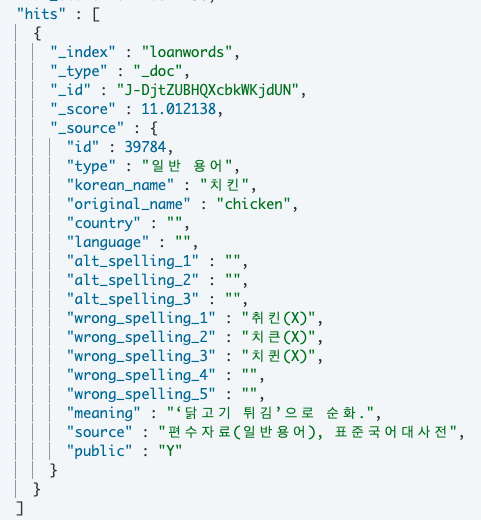| 일 | 월 | 화 | 수 | 목 | 금 | 토 |
|---|---|---|---|---|---|---|
| 1 | 2 | 3 | 4 | 5 | 6 | |
| 7 | 8 | 9 | 10 | 11 | 12 | 13 |
| 14 | 15 | 16 | 17 | 18 | 19 | 20 |
| 21 | 22 | 23 | 24 | 25 | 26 | 27 |
| 28 | 29 | 30 | 31 |
Tags
- MySQL
- License
- matplotlib
- query
- aggregation
- Kafka
- licence delete curl
- aggs
- Java
- Python
- license delete
- 900gle
- high level client
- flask
- analyzer test
- springboot
- sort
- Elasticsearch
- TensorFlow
- 파이썬
- zip 파일 암호화
- plugin
- zip 암호화
- Mac
- ELASTIC
- Test
- docker
- 차트
- API
- token filter test
Archives
- Today
- Total
개발잡부
[es] 로그에서 외래어 추출 본문
반응형
외래어 추출.. 을 하라고 한다..
애매하다..
로그에서 외래어라고 판단하는건 사람이 해야 하는데.. 추출을 하면 그게 또 근거를 제시해야 하는..
아무튼..
생각해낸 방법은
한국어 어문규범
여기에 등록된 67,184개의 외래어를 이용했다.
일단 이걸 색인으로 만들었다. 시간이 없어서 지피티 선생님을 활용해 인덱스 생성 쿼리를 급하게 만들고
색인쿼리도 급 제작
최근 검색어 최근 1주일(3/13 ~ 3/20)
- 최근검색어 (실패검색어로 변경) 에서 상위 30,000개 추출
- 추출된 검색어와 외래어를 비교하여 추출 (추출기준 하단 참고)
- 공백없이 한단어로 이루어진 단어 (5,322개)
- 추출된 외래어와 편집거리 1에서 비슷한 단어 검색로그에서 추출 (유입수 10 이상)
- 작업자의 판단으로 진행여부 결정 (약 250개 예상)
외래어 기준
한국어 어문 규범에 등록된 67,184개의 외래어와 비교하여 추출
- konlpy mecab 형태소 분석을 통한 전처리 (일반명사와 고유명사로 분리해서 처리 )
- 일반명사(NNG)
- 단어 사이에 공백 추가 (복합어를 multi_match 하기 위함)
- 한국어 어문 규범 인덱스에 조회 결과로 외래어 판단
- fuzziness : "AUTO" 의 multi_match
- 편집거리
- 길이 1~2의 단어: 편집 거리 0 (완전히 동일해야 검색)
- 길이 3~5의 단어: 편집 거리 최대 1 허용
- 길이 6 이상의 단어: 편집 거리 최대 2 허용
- 분해된 텀의 70% 이상 일치하는 경우 검색결과로 인정
- 검색어 한글자 이상
- 한국어 어문 규범 조회결과 한글자 이상
- 편집거리
- lanquage: 영어
- 인명 제외
- fuzziness : "AUTO" 의 multi_match
- 검색결과가 한글자로 이루어진 단어인 경우 외래어 후보 처리
- 고유명사(NNP)
- 외래어 후보 처리 (사람의 판단 필요)
- 한글만으로 이루어진 키워드
- 일반명사(NNG)
결과

PUT /loanwords
{
"settings": {
"number_of_shards": 2,
"number_of_replicas": 1,
"refresh_interval": "30h"
},
"mappings": {
"properties": {
"id": { "type": "integer" },
"type": { "type": "keyword" },
"korean_name": {
"type": "text",
"fields": {
"raw": { "type": "keyword" }
}
},
"original_name": {
"type": "text",
"fields": {
"raw": { "type": "keyword" }
}
},
"country": { "type": "keyword" },
"language": { "type": "keyword" },
"alt_spelling_1": { "type": "text" },
"alt_spelling_2": { "type": "text" },
"alt_spelling_3": { "type": "text" },
"wrong_spelling_1": { "type": "text" },
"wrong_spelling_2": { "type": "text" },
"wrong_spelling_3": { "type": "text" },
"wrong_spelling_4": { "type": "text" },
"wrong_spelling_5": { "type": "text" },
"meaning": { "type": "text" },
"source": { "type": "text" },
"public": { "type": "keyword" }
}
}
}
# -*- coding: utf-8 -*-
import json
import time
import datetime as dt
import urllib3
import config
import pandas as pd
import csv
from elasticsearch import Elasticsearch, helpers
urllib3.disable_warnings(urllib3.exceptions.InsecureRequestWarning)
def connected():
try:
info = client.info()
version = info['version']['number']
print(f"Elasticsearch 버전: {version}")
except Exception as e:
print(f"Elasticsearch에 연결할 수 없습니다: {e}")
def extrect():
print("extrect start")
with open(DIC_FILE, "r", encoding="utf-8-sig") as dic:
csv_reader = csv.reader(dic)
for row in csv_reader:
row = [cell.strip() for cell in row]
print(row) # 각 행을 리스트로 출력
document = {
"id": int(row[0]), # 번호 (ID)
"type": row[1], # 구분
"korean_name": row[2], # 한글 표기
"original_name": row[3], # 원어 표기
"country": row[4], # 국명
"language": row[5], # 언어명
"alt_spelling_1": row[6], # 이표기1
"alt_spelling_2": row[7], # 이표기2
"alt_spelling_3": row[8], # 이표기3
"wrong_spelling_1": row[9], # 오표기1
"wrong_spelling_2": row[10], # 오표기2
"wrong_spelling_3": row[11], # 오표기3
"wrong_spelling_4": row[12], # 오표기4
"wrong_spelling_5": row[13], # 오표기5
"meaning": row[14], # 의미
"source": row[15], # 출전
"public": row[16] # 공개 여부
}
action = {
"_op_type": "index", # "index"는 데이터를 색인하는 작업
"_index": INDEX_NAME, # 인덱스 이름
"_source": document # 실제 데이터
}
# bulk API를 사용하여 데이터 색인
helpers.bulk(client, [action])
client.indices.refresh(index=INDEX_NAME)
print("데이터 색인 완료!")
##### MAIN SCRIPT #####
if __name__ == '__main__':
client = Elasticsearch("https:///", ca_certs=False,
verify_certs=False)
connected()
START = f"{config.START}"
END = f"{config.END}"
SIZE = f"{config.SIZE}"
STEP1_EXTRACT_RESULT_FILE = "./result/step1_extrect_result.txt"
STEP2_EVENT_KEY_MATCH_RESULT_FILE = "./result/step2_evnet_key_match_result.txt"
STEP3_ADD_COUNT_RESULT_FILE = "./result/step3_add_count_result.txt"
KOREAN_WORD = "./query/korean_word.txt"
MAIN_KEY = "./query/keyword.txt" #base 키워드
DIC_FILE = "./query/foregin_dic.csv"
INDEX_NAME = "loanwords"
QUERY_FILE = "./query/query.json"
TERM_QUERY_FILE = "./query/term_query.json"
ADD_COUNT_KEY = "./query/add_count_keyword.txt"
extrect()
print("Done.")
치킨을 돌려보면

이렇게 나온다.
# -*- coding: utf-8 -*-
import json
import time
import datetime as dt
import urllib3
import config
from elasticsearch import Elasticsearch
from konlpy.tag import Okt, Mecab
import re
okt = Okt()
mecab = Mecab()
urllib3.disable_warnings(urllib3.exceptions.InsecureRequestWarning)
def insert_spaces(keyword):
okt = Okt()
# 형태소 분석을 통해 단어 분리
words = okt.morphs(keyword)
return ' '.join(words)
def connected():
try:
info = client.info()
version = info['version']['number']
print(f"Elasticsearch 버전: {version}")
except Exception as e:
print(f"Elasticsearch에 연결할 수 없습니다: {e}")
def is_only_korean(text):
return bool(re.match('^[가-힣\s]+$', text))
def has_two_or_more_words(text):
words = text.strip().split()
return len(words) >= 2
def extrect():
print("extrect start")
step1_extrect_array = set()
with open(FAIL_QUERY_FILE) as query_file:
query_source = query_file.read().strip()
query_source = query_source.replace("${start}", START)
query_source = query_source.replace("${end}", END)
query = query_source.replace("${size}", SIZE)
response = client.search(index=FAIL_INDEX_NAME, body=query)
for val in response['aggregations']['KEYWORD']['buckets']:
if not has_two_or_more_words(val['key']):
loan = check_loanword(val['key'])
if loan is None:
print("None: "+val['key']+","+str(val['doc_count']) )
else:
if (
is_only_korean(val['key']) and
len(val['key']) > 1 and
len(loan['korean_name']) > 1 and
not has_two_or_more_words(loan['korean_name'])
):
step1_extrect_array.add(val['key']+","+str(val['doc_count'])+","+check_loanword_list(val['key'])+","+loan['korean_name']+","+loan['tag'] +"\n")
with open(STEP1_EXTRACT_RESULT_FILE, "w", encoding="utf-8") as outfile:
outfile.writelines(step1_extrect_array)
print(f"파일생성: "+STEP1_EXTRACT_RESULT_FILE)
def check_loanword_list(keyword):
ret_array = set()
with open(FUZZY_QUERY_FINAL_FILE) as query_file:
query_source = query_file.read().strip()
query_source = query_source.replace("${start}", START)
query_source = query_source.replace("${end}", END)
query_source = query_source.replace("${length}", str(len(keyword)))
query = query_source.replace("${keyword}", keyword)
response = client.search(index=INDEX_NAME, body=query)
for val in response['aggregations']['KEYWORD']['buckets']:
if (val['doc_count'] > 10):
ret_array.add(val['key'])
return (' | ').join(ret_array)
def check_loanword(keyword):
with open(FUZZY_QUERY_FILE) as query_file:
query_source = query_file.read().strip()
result = analyze_with_mecab(keyword)
if len(result["common_nouns"]) > 0 :
print("common_nouns: " + str(result["common_nouns"]))
common_nouns = result["common_nouns"]
search_word = ' '.join(common_nouns)
query = query_source.replace("${keyword}", search_word)
response = client.search(index=LOAN_INDEX_NAME, body=query)
for hit in response["hits"]["hits"]:
if(hit["_source"]):
return { "korean_name" : hit["_source"]["korean_name"], "tag" : "NNG" }
return None
elif len(result["proper_nouns"]) > 0:
return { "korean_name" : keyword, "tag" : "NNP" }
else:
return None
def analyze_with_mecab(text):
mecab = Mecab()
pos = mecab.pos(text)
proper_nouns = [] # 고유명사 (NNP)
common_nouns = [] # 일반명사 (NNG)
others = [] # 그 외 품사
for word, tag in pos:
if tag == 'NNP':
proper_nouns.append(word)
elif tag == 'NNG':
common_nouns.append(word)
else:
others.append((word, tag))
return {
"proper_nouns": proper_nouns,
"common_nouns": common_nouns,
"others": others
}
def get_type():
if len(sys.argv) < 1:
print("사용법: python extrect.py full")
else:
print("첫 번째 인자:", sys.argv[1])
return sys.argv[1]
##### MAIN SCRIPT #####
if __name__ == '__main__':
client = Elasticsearch("https://", ca_certs=False,
verify_certs=False)
connected()
START = f"{config.START}"
END = f"{config.END}"
SIZE = f"{config.SIZE}"
STEP1_EXTRACT_RESULT_FILE = "./result/step1_extrect_result.txt"
STEP2_EXTRACT_RESULT_FILE = "./result/step2_extrect_result.txt"
INDEX_NAME = "home-search-query-log"
FAIL_INDEX_NAME = "home-failure-querylog-2025.03"
LOAN_INDEX_NAME = "loanwords"
QUERY_FILE = "./query/query.json"
FAIL_QUERY_FILE = "./query/fail_query.json"
FUZZY_QUERY_FILE = "./query/fuzzy_query.json"
FUZZY_QUERY_FINAL_FILE = "./query/fuzzy_query_final.json"
extrect()
# keyword = "즉석카레"
# print(check_loanword_list(keyword))
# keyword = "아이스크림"
# print(check_loanword(keyword))
print("Done.")반응형
